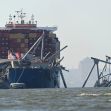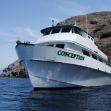The owner and manager of the cargo ship involved in the catastrophic collision with Baltimore’s Francis Scott Key Bridge have filed a court petition to limit their financial liability. Singapore-based Grace Ocean Private Ltd., the owner of the vessel named the Dali, and Synergy Marine Pte Ltd., the ship's manager, are seeking to cap their liability at approximately $43.6 million, according to documents filed in a federal court in Maryland. This figure is derived from the vessel's estimated value and income from freight minus significant repair and salvage costs. The petition leverages a provision from an 1851 maritime law, demonstrating the enduring influence of historical statutes on modern legal proceedings.
This legal strategy, while routine in maritime cases, highlights the unique aspects of U.S. maritime law that allow shipowners to limit their financial exposure following accidents. The law, dating back to the pre-Civil War era, permits owners to tie their liability to the post-accident value of their vessel, a strategy that has been invoked in numerous maritime incidents.
Maritime law, also known as admiralty law, governs legal disputes that occur on navigable waters, including oceans, seas, and lakes. This body of law covers a wide range of matters, such as shipping, navigation, waterside commerce, and the rights and responsibilities of seafarers. Maritime law is distinct from the law of the land because it involves principles and traditions that date back centuries and are tailored to the unique demands and challenges of maritime activities.
Maritime law applies in situations involving the transportation of goods and passengers by water, accidents or injuries at sea, maritime contracts, and offenses that occur on shipboard. It encompasses both domestic law, governing waters within a country's territory, and international law, regulating activities on the high seas and between ports of different countries. Key areas under maritime law include the regulation of maritime commerce, marine navigation, marine salvaging, shipping pollution, the hiring and treatment of crew members, and the resolution of maritime disputes.
The principles of maritime law are designed to facilitate smooth international trade by providing a coherent set of rules that apply across different jurisdictions. This is crucial for resolving disputes that may involve parties from multiple countries with differing legal systems. For instance, the United Nations Convention on the Law of the Sea (UNCLOS) is a key international treaty that establishes guidelines for businesses and governments regarding the use of the world's oceans and marine resources.
In the context of accidents or disasters at sea, such as the collision of a cargo ship with a bridge, maritime law will determine liability, the extent of damages payable, and the legal rights of those affected. The unique aspect of maritime law, such as the limitation of liability clause, allows shipowners to limit their financial liability to the value of the ship after the incident, subject to certain conditions and legal scrutiny. This aspect of maritime law aims to encourage shipping and trade by capping potential losses, but it also raises complex legal questions about fairness and accountability in the aftermath of maritime disasters.
The resolution of the Francis Scott Key Bridge incident is expected to be a lengthy process, with legal experts predicting that the factual investigation into the cause of the disaster and potential preventative measures will be the primary focus. The incident's legal and financial ramifications are already drawing comparisons to the Costa Concordia shipwreck, with predictions suggesting that the Baltimore bridge collapse could surpass it as the most expensive marine insured loss in history.
The tragedy has had a profound impact on the local community and economy, particularly with the closure of the Port of Baltimore, a critical hub for shipping and commerce. The human cost of the disaster is also significant, with eight workers on the bridge at the time of the collapse, leading to fatalities and several individuals still missing.






